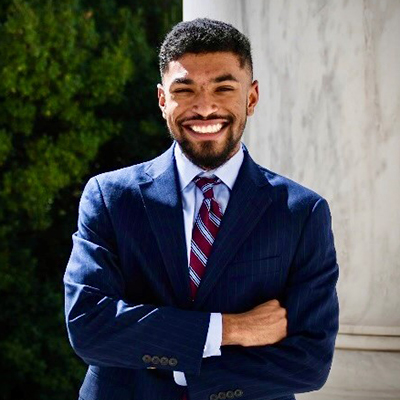
While he was first drawn to George Mason University by its proximity to the nation’s capital, Ian Gates discovered a passion for local politics and community organizing during his time in the Schar School of Policy and Government.
Gates, who graduates this month with a bachelor of science degree in public administration, continually found new experiences to complement his degree while studying government.
“I found basically something different to do every semester,” he said about the past four years. From interning in the office of former U.S. Rep. Tom O’Halleran (D) on Capitol Hill to working as a fellow at the nonprofit and nonpartisian political encyclopedia Ballotpedia—with other illuminating positions in between—Gates found ways to apply his love for and knowledge of policy in just about every level of government.
With a location on the outskirts of the seat of U.S. government in Washington, D.C., the Schar School, and Mason in general, are singularly situated to facilitate experiential learning for those desiring to accelerate their political careers. Practitioners as professors, high-profile guest speakers, and internships at key agencies are just a few of the ways the Schar School helps students achieve their goals in public affairs.
It was through taking diverse policy classes at the Schar School that Gates, a native of Atlanta, Georgia, discovered his passion for local government and political organizing.
For instance, in a class about education in the U.S., Gates developed an interest in education policy. The real-world implications of this policy issue area were made immediately evident to him when professor Anne Holton sent the class to an Arlington County, Virginia, school board meeting to see education policy in action.
This inspiring experience proved valuable: Gates researched education funding policy during his time working for Georgia Engage, an organization involved in state-level policy issues.
Similarly, Gates found his Schar School urban planning class particularly fascinating and immediately applicable.
“I've always had an interest in urban planning and transportation policy,” Gates said, “but it was especially cool to learn more about the technical aspects.” Studying urban planning and learning the terminology of this niche policy topic encouraged him to attend his first zoning meeting in his hometown of Atlanta.
As the city leaders discussed rewriting their zoning ordinances for the first time in 40 years, Gates understood the policy issues of land-use planning being weighed. He appreciated, he said, “being able to make educated opinion, or make educated statements about these topics, and make an impact on my community.”
Gates looks forward to quickly applying his experience in local political organizing and education policy as he begins a post-graduation position with the Tulsa Service Year program, a one-year fellowship for recent college graduates designed to teach political leadership skills. Working on education policy with a group of nonprofits in Tulsa, Oklahoma, Gates will use the knowledge and skills he gained from the Schar School at the local level.
Gates’ words of advice to Mason students is to take advantage of opportunities the Schar School, the university as a whole, and the Washington, D.C., region has to offer. “Be a part of the community and be engaged,” he said.
Gates especially encourages government students to get involved in local and regional politics and not forget their impact on all levels of policy work.
“Everyone [should] go to your local planning and school board meetings,” Gates said, “because these decisions are going to be made whether you’re there or not, so you’d rather be there. Politics will affect you whether you choose to affect it or not.”
In This Story
Read More Graduation Stories
- April 15, 2024
- December 12, 2023
- December 5, 2023
- May 10, 2023
- April 26, 2023
